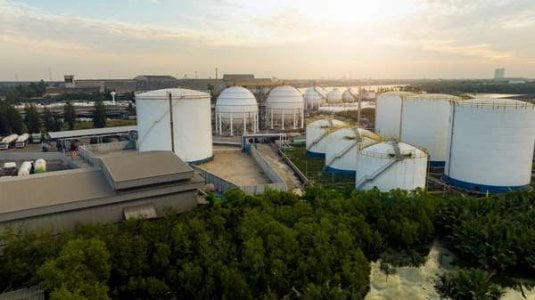Could a scorching summer lead to gas shortages and power outages? ACCC issues a dire warning
Here at the Seniors Discount Club, we’d normally associate summertime with sunshine and warm days.
Unfortunately, according to a shocking new report by the Australian Competition and Consumer Commission (ACCC), a hot summer carries risks beyond too much heat.
The ACCC warned that the warm weather could trigger a liquefied natural gas (LNG) supply shortage for Australia’s east coast market.
Based on their September Interim Gas Inquiry Report, the gas supply is expected to narrowly avoid a shortfall in the 2024 March quarter—but that is based on the assumption that Australia’s excess gas won’t be sent overseas and that demand for gas used to generate electricity won’t increase any higher than a certain level.
‘If additional uncontracted gas is exported and there is an upswing in gas-powered generation demand, then gas supply could be insufficient to meet demand,’ the ACCC said.
Needless to say, these are huge assumptions, and they both hinge on the weather staying cool and consumer habits remaining unchanged.
If the heat is cranked up to full blast, a gas shortage is almost inevitable. And with gas shortages come increased prices and possible power outages.
Meanwhile, the federal government suggested that the improved outlook meant domestic shortages would be avoided, and higher exports would top up government tax revenues.
But the ACCC remains concerned. ‘While the overall outlook is positive, there remains a risk that the outlook could worsen, particularly from higher-than-expected gas demand,’ it noted.
The report—released on Wednesday, September 20—looked at the demand and supply of gas into 2024. It mentioned that the East Coast would probably have 1.4 petajoules of surplus gas in the first quarter if all uncontracted LNG is exported.
However, the surplus had been reduced from 7.2 petajoules excess compared to three months ago.
Based on the June 2023 forecast, the supply of gas in the March quarter will be 5.9 petajoules—which is higher than predicted—and export demand is expected to rise to 8.2 petajoules.
Resources Minister Madeleine King stated: ‘This latest advice from the ACCC shows the gas outlook for 2024 is improving thanks to the sustained effort of government and industry to ensure there is sufficient gas supply at reasonable prices to meet domestic demand.’
But regardless of the projected surplus for early 2024, concerns about potential long-term winter shortages remain.
'While the report provides a positive outlook for the next six months, the ACCC did not update their long-term outlook with forecast shortfalls still likely from 2027 unless production is expanded,' said Samantha McCulloch, Chief Executive of the peak LNG industry body Australian Energy Producers.
‘New gas supply is urgently needed and can put downward pressure on prices, reduce emissions by replacing coal and deliver substantial economic benefits to Australians,’ she added.
Ms McCulloch claimed that investments were essential, especially in New South Wales and Victoria, where most residents rely on gas.
Since the Albanese government introduced a price cap—currently at $12 a gigajoule—and an additional code of conduct on the gas trade, there has been very little effort in developing new gas supply projects.
During that time, the intervention was met with opposition from gas producers who claimed that the federal government was ‘taking control’ of the market and warned of a future dysfunction and higher energy bills without plans to ensure additional supply.
Last March, the Australian Energy Market Operator forewarned that businesses and households could have winter gas supply shortages. This was magnified by the reduced production from the Bass Strait, the East Coast’s primary source of domestic gas.
Treasurer Jim Chalmers has stated that the short-term positive outlook has been complemented by the federal government’s mandatory gas code of conduct that the Coalition had opposed.
‘Our energy price relief plan is deliberately designed to deliver better, fairer prices for Australian consumers at the same time as we honour our trusted role as an energy supplier,’ Dr Chalmers said.
‘It’s really pleasing to see more evidence that it is working as we intended,’ he added.

What do you think of this story, members? Share your thoughts in the comments below!
Unfortunately, according to a shocking new report by the Australian Competition and Consumer Commission (ACCC), a hot summer carries risks beyond too much heat.
The ACCC warned that the warm weather could trigger a liquefied natural gas (LNG) supply shortage for Australia’s east coast market.
Based on their September Interim Gas Inquiry Report, the gas supply is expected to narrowly avoid a shortfall in the 2024 March quarter—but that is based on the assumption that Australia’s excess gas won’t be sent overseas and that demand for gas used to generate electricity won’t increase any higher than a certain level.
‘If additional uncontracted gas is exported and there is an upswing in gas-powered generation demand, then gas supply could be insufficient to meet demand,’ the ACCC said.
Needless to say, these are huge assumptions, and they both hinge on the weather staying cool and consumer habits remaining unchanged.
If the heat is cranked up to full blast, a gas shortage is almost inevitable. And with gas shortages come increased prices and possible power outages.
Meanwhile, the federal government suggested that the improved outlook meant domestic shortages would be avoided, and higher exports would top up government tax revenues.
But the ACCC remains concerned. ‘While the overall outlook is positive, there remains a risk that the outlook could worsen, particularly from higher-than-expected gas demand,’ it noted.
The report—released on Wednesday, September 20—looked at the demand and supply of gas into 2024. It mentioned that the East Coast would probably have 1.4 petajoules of surplus gas in the first quarter if all uncontracted LNG is exported.
However, the surplus had been reduced from 7.2 petajoules excess compared to three months ago.
Based on the June 2023 forecast, the supply of gas in the March quarter will be 5.9 petajoules—which is higher than predicted—and export demand is expected to rise to 8.2 petajoules.
Resources Minister Madeleine King stated: ‘This latest advice from the ACCC shows the gas outlook for 2024 is improving thanks to the sustained effort of government and industry to ensure there is sufficient gas supply at reasonable prices to meet domestic demand.’
But regardless of the projected surplus for early 2024, concerns about potential long-term winter shortages remain.
'While the report provides a positive outlook for the next six months, the ACCC did not update their long-term outlook with forecast shortfalls still likely from 2027 unless production is expanded,' said Samantha McCulloch, Chief Executive of the peak LNG industry body Australian Energy Producers.
‘New gas supply is urgently needed and can put downward pressure on prices, reduce emissions by replacing coal and deliver substantial economic benefits to Australians,’ she added.
Ms McCulloch claimed that investments were essential, especially in New South Wales and Victoria, where most residents rely on gas.
Since the Albanese government introduced a price cap—currently at $12 a gigajoule—and an additional code of conduct on the gas trade, there has been very little effort in developing new gas supply projects.
During that time, the intervention was met with opposition from gas producers who claimed that the federal government was ‘taking control’ of the market and warned of a future dysfunction and higher energy bills without plans to ensure additional supply.
Last March, the Australian Energy Market Operator forewarned that businesses and households could have winter gas supply shortages. This was magnified by the reduced production from the Bass Strait, the East Coast’s primary source of domestic gas.
Treasurer Jim Chalmers has stated that the short-term positive outlook has been complemented by the federal government’s mandatory gas code of conduct that the Coalition had opposed.
‘Our energy price relief plan is deliberately designed to deliver better, fairer prices for Australian consumers at the same time as we honour our trusted role as an energy supplier,’ Dr Chalmers said.
‘It’s really pleasing to see more evidence that it is working as we intended,’ he added.
Key Takeaways
- A new report by the Australian Competition and Consumer Commission (ACCC) warned of a potential LNG supply shortage due to a hot summer and power station outages.
- The ACCC's report stressed that avoiding a gas shortage in early 2024 hinges on Australia's excess gas not being exported and demand for gas-powered electricity not increasing.
- Despite a positive projection from the federal government, the ACCC cautioned of a potentially worsening gas situation, especially due to higher-than-expected gas demand.
- Investment is needed, particularly in New South Wales and Victoria, to meet the gas demands of large populations, and despite a projected surplus for early 2024, concerns for potential long-term winter shortages are still unaddressed.
What do you think of this story, members? Share your thoughts in the comments below!








